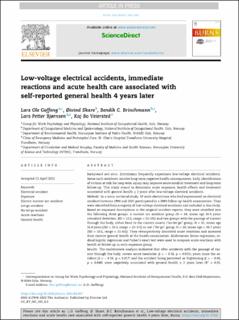| dc.description.abstract | Background and aims Electricians frequently experience low-voltage electrical accidents. Some such accidents involve long-term negative health consequences. Early identification of victims at risk for long-term injury may improve acute medical treatment and long-term follow-up. This study aimed to determine acute exposure, health effects and treatment associated with general health ≥ 2 years after low-voltage electrical accidents. Methods In a cross-sectional study, 89 male electricians who had experienced an electrical accident between 1994 and 2001 participated in a 2003 follow-up health examination. They were identified from a registry of low-voltage electrical accidents and included in the study. Based on exposure descriptions in the original accident reports, they were stratified into the following three groups: a current arc accident group (N = 34, mean age 38.8 years [standard deviation, SD = 12.2, range = 21–59]) and two groups with the passage of current through the body, either fixed to the current source (“no-let-go” group; N = 35, mean age 34.0 years [SD = 10.5, range = 21–57]) or not (“let-go” group; N = 20, mean age = 38.7 years [SD = 10.3, range = 21–63]). They retrospectively described acute reactions and assessed their current general health at the health examination. Multivariate linear regression, ordinal logistic regression and Fisher’s exact test were used to compare acute reactions with health at follow-up in each exposure group. Results The multivariate analysis indicated that after accidents with the passage of current through the body, severe acute headache (β = − 0.56, p = 0.013), years since the accident (β = − 0.16, p = 0.017) and the accident being perceived as frightening (β = − 0.48, p = 0.040) were negatively associated with general health ≥ 2 years later (R2 = 0.25, p = 0.002). If the exposure included a no-let-go experience, then acute severe body numbness (β = − 0.53, p = 0.029) was also negatively associated with general health (R2 = 0.38, p = 0.002). Without such experience, only acute confusion (β = − 0.90, p = 0.029) was negatively associated with the health at follow-up (R2 = 0.24, p = 0.029). In univariate analyses, after the passage of current through the body, acute dizziness (p = 0.029), apathy (p = 0.028), confusion (p = 0.007) and irregular heartbeat (p ≤ 0.05) were associated with poor long-term general health. The no-let-go group, more often than the let-go group, reported panic (p = 0.001), fear of death (p = 0.029), confusion (p = 0.014), exhaustion (p = 0.009), bodily numbness (p = 0.013) and immediate unconsciousness (p = 0.019). Acute symptoms beyond the first day after a current arc accident were associated with poor long-term general health (p = 0.015). Discussion and conclusions The acute reactions negatively associated with general health ≥ 2 years after low-voltage electrical accidents should alert the clinician in the acute phase after an electrical accident to the risk of developing negative long-term health effects. Future studies should specify long-term health beyond the concept of general health. | |
